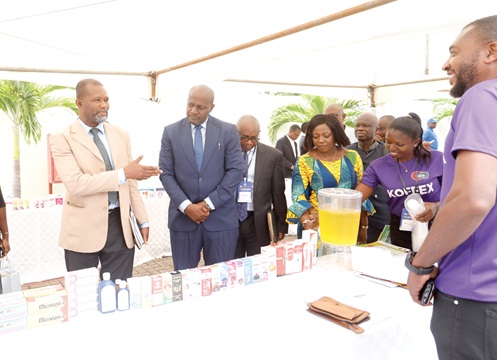
Devt of migration policy for underway
The government has initiated steps to develop a migration policy within the health sector to standardise procedures and ensure ethical recruitment practices.
Also, some initiatives have been rolled out to improve the condition of service of health workers, as well as provide packages for their professional development in order to stem brain drain of medical professionals.
The Minister of Health, Dr Bernard Okoe-Boye, who disclosed this, said it would also protect health professionals from being short-changed. This was contained in a speech read on his behalf by the Director of Allied Health of the Ministry of Health, Dr Ignatius Awinibuno, at the 43rd annual general meeting of the Society of Private Medical and Dental Practitioners in Accra last Friday.
The three-day general meeting which ended last Saturday was on the theme: "Health sector brain drain to brain gain: The role of private practitioners.”
Agreement
For instance, the minister mentioned the bilateral agreement between the government and its Barbados counterpart to protect the interests of health workers as part of the initiatives.
"There are a lot of untapped opportunities in the Diaspora to improve our health care system. I urge members of the society to engage their peers in the Diaspora to form partnerships to improve Ghana's healthcare system," he said.
The minister also entreated Ghanaian doctors migrating to foreign countries to return and transform the country's health system with the knowledge and experiences they had gained.
Dr Oko-Boye said although the country had made some significant strides in healthcare delivery, issues of training and retaining of health professionals remained a challenge.
He said the establishment of the Ghana College of Physicians and Surgeons, which trained medical professionals had helped to reduce the brain drain syndrome, adding that hitherto, such postgraduate training could only be offered abroad.
The minister, however, reckoned the need to offer competitive salaries, access to technology and opportunities for career development to motivate health workers to stay.
Investment
The President of the Society of Private Medical and Dental Practitioners, Dr Andre Kwasi-Kumah, called for investment in research and development as it was key to stemming the brain drain syndrome.
He appealed to the ministry to second lecturers to private health institutions to help ease the cost burden and subsidise the cost of training.
The provost of the College of Health Sciences, Kwame Nkrumah University of Science and Technology (KNUST), Prof. Christian Aggrey, said brain drain had a negative impact on attaining Universal Health Coverage (UHC) by 2030; Sustainable Development Goals (SDGs), especially SDG Goal Three; the African Union Agenda 2063, and the Global Action Plan for Healthy Lives and Wellbeing.
He underscored the fact that rural areas and private healthcare facilities were especially hard-hit and grappling with the consequences of under-staffing and its impact on the quality and accessibility of healthcare services.
